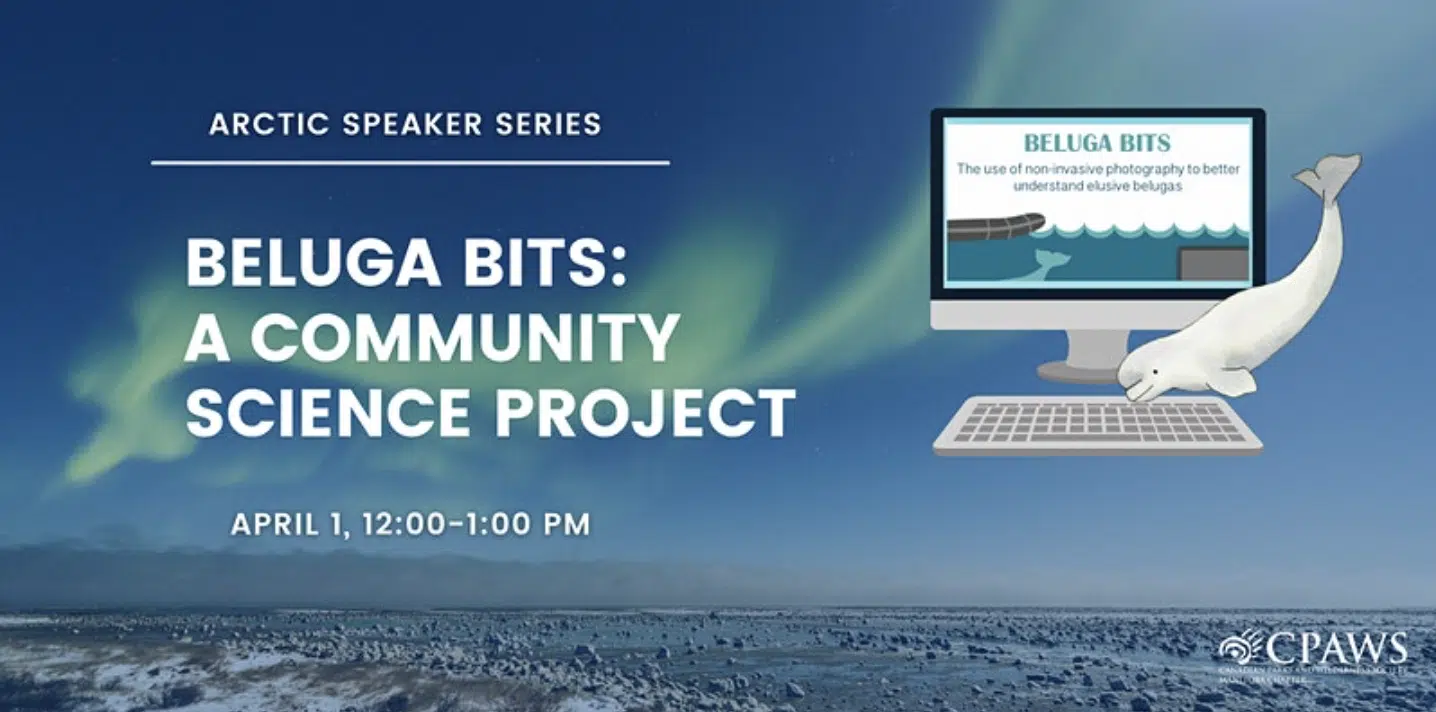
Beluga Bits: A Community Science Project
Learn how you can get involved in beluga whale research through a community science project with Assiniboine Park Zoo!
Manitoba is home to one of the greatest concentrations of beluga whales on the planet. In the spring as the ice melts in Western Hudson Bay, some 55,000 beluga whales migrate to the region’s major estuaries on the Churchill, Nelson, and Seal rivers to moult, calve, and feed.
In the Churchill River estuary, access is easy which provides incredible opportunities to see and learn more about these amazing whales.
Here, Assiniboine Park Zoo researchers work with partners to run Beluga Bits, a citizen science-powered project that uses underwater imagery to peek into the world of beluga whales.
Join us for a CPAWS Manitoba webinar with Ashleigh Westphal, Research Conservation Specialist with the Assiniboine Park Conservancy, who explains the important role of community science in researching whales, what researchers have discovered through the project so far, and how you can get involved with the project from your own classroom or home.
Through the Beluga Bits website, participants can view amazing underwater photos of whales while helping to classify thousands of images each year. This information is used by researchers to learn more about beluga biology and behaviour, as well as to help identify potential threats in their environment. The primary goal with the Beluga Bits project is to engage people in ocean conservation and research while creating a dataset that can be used to better understand and conserve Manitoba’s beluga whales.
Community science offers diverse and engaging opportunities for the public to contribute to real-world scientific research and inspire people to become stewards of the natural world.
Through the Beluga Bits project, people from around the world can connect with Manitoba’s whales while helping answer questions about beluga biology, social structure, threats, and ocean health.
This webinar is part of CPAWS Manitoba‘s Arctic Speaker Series, which explores the research being done in Manitoba’s Arctic and subarctic regions and highlights the global importance of the area. Manitoba’s north is a significant wildlife habitat, home to some of the largest concentrations of beluga whales and polar bears on the planet, along with hundreds of species of birds that nest along the coast of Western Hudson Bay. CPAWS Manitoba supports the safeguarding of these wild spaces and species through its Western Hudson Bay NMCA and Polar Bear Provincial Park initiatives.
About the Speaker
Ashleigh Westphal is a Research Conservation Specialist with the Assiniboine Park Conservancy in Winnipeg, Manitoba. Ashleigh joined the Conservation and Research department at Assiniboine Park Zoo in 2020 and has collaborated on a variety of projects focusing on butterflies, birds, and beluga whales.
The Assiniboine Park Conservancy is committed to working to conserve animals in the wild and inspiring the public to learn about natural places and the wildlife that inhabit them.
How can we help?
If you have any questions or require any additional accommodations to participate, please email us at [email protected].
About CPAWS Manitoba
CPAWS Manitoba has been instrumental in establishing 22 new parks and protected areas in our province. That’s an area larger than Lake Winnipeg at nearly 26,000 square kilometres. Our goal is to protect half of Manitoba’s lands and waters.
–Lunch and Learns–
Nature has been here for us during the pandemic.
CPAWS Manitoba wants to maintain this positive connection to nature by providing a space for Manitobans to connect online from the safety of our homes and be inspired by nature in our backyards and beyond.
Join CPAWS Manitoba for weekly lunch and learn presentations from experts across the province who will share their knowledge and passion and bring new nature-inspired activities into our lives.
*** This program is possible thanks to the generous support of The Winnipeg Foundation and the Conservation Trust, a Manitoba Climate and Green Plan Initiative delivered by the Manitoba Habitat Heritage Corporation. ***
